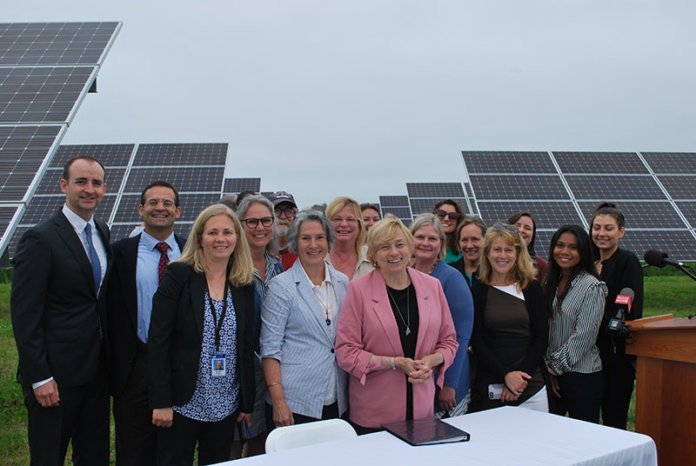On Wednesday, standing in front of a solar array in the presence of lawmakers and renewable energy stakeholders, Gov. Janet Mills, D-Maine, signed into law three major pieces of bipartisan clean energy legislation.
The bills establish in law the governor’s proposed Maine Climate Council, which is charged with developing action plans to reduce Maine’s greenhouse-gas (GHG) emissions 45% by 2030 and 80% by 2050; an increase in Maine’s renewable portfolio standard (RPS) from 40% to 80% by 2030 and a goal of 100% renewable energy by 2050; the creation of new incentives for energy-efficient heating; and the institution of new solar incentive programs.
“With the signing of these bills, Maine is ushering in a new era of clean energy and climate leadership,” said Mills. “The Maine Climate Council will develop comprehensive action plans to meet our ambitious emissions reductions goals, and the renewable energy legislation will spur clean energy development and investments that will increase production of homegrown, renewable energy and create good-paying jobs for the people of Maine. Maine is once again leading on clean energy.”
First, L.D.1679, An Act To Promote Clean Energy Jobs and To Establish the Maine Climate Council, is a governor’s bill sponsored by State Sen. David Woodsome, R-York. The Maine Climate Council was proposed by Mills in April.
“I am honored to have sponsored L.D.1679 … it has been in the making for several years and finally found a champion in Governor Mills,” said Woodsome. “There is still much work to be done to make this effort comprehensive and economically effective. I look forward to achieving this goal.”
Under L.D.1494, An Act To Reform Maine’s Renewable Portfolio Standard – sponsored by State Sen. Eloise Vitelli, D-Arrowsic – the state’s RPS doubles, and the Public Utilities Commission must procure long-term contracts for new clean energy generation, which may be paired with energy storage.
“The update of our renewable portfolio standards provides the needed steps to protect our natural resources while investing in our economy,” said Vitelli.
L.D.1711, An Act To Promote Solar Energy Projects and Distributed Generation Resources in Maine – sponsored by State Sen. Dana Dow, R-Lincoln – will incentivize at least 375 MW of new distributed generation in Maine, which is expected to be primarily solar PV development for projects under 5 MW. The bill creates two separate but complementary incentives, one for commercial and institutional customers and another for community solar projects, with prices that are set competitively and decline in subsequent procurements.
This bill also removes the net energy billing account and size cap, requires that community solar projects serve low- and moderate-income customers, and encourages the development of landfill and brownfield projects. In addition, L.D.1711 allows for a new net energy billing program with an alternative bill credit for non-residential customers.
“This new law allows medium-sized projects like schools and municipalities to get into the solar market, and many larger solar companies are excited about the jobs it will create here in Maine,” said Dow.
The bill-signing ceremony was held at the largest solar array in the state, a 10 MW installation in Pittsfield that was constructed by Pittsfield Solar LLC, a subsidiary of Cianbro Corp.
Sean Gallagher, vice president of state affairs at the Solar Energy Industries Association, congratulates Maine for its clean energy efforts.
“For too long, Maine has lagged behind on solar because of backward policies that singled out solar customers and tacked on unnecessary fees,” says Gallagher. “Over the past few months, the Maine legislature reversed these harmful policies and, just this week, set the industry up for success with aggressive new targets that are now signed into law. Solar will undoubtedly play a major role in meeting the state’s 80 percent renewable energy target by 2030 and 100 percent by 2050. Codifying these goals sends a strong signal that the nascent solar market in Maine is about to take off, bringing clean energy, jobs and new investments along with it. We commend the Maine Legislature and Governor Mills for getting back on track and jump-starting Maine’s solar future.”




